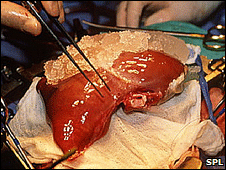| ||||||||||||||||||||||||||||||||||||||||||||||||||||||||||||||||||||||||||||||||
|
israel is to become the first country to give 1 card carriers a legal right to priority treatment if they should require an organ transplant. 以色列成为第一个当器官捐献卡持有者需要器官移植时,给予其优先治疗权的国家。  organs for transplant are in short supply the law has been changed to try to boost donation rates, as there is a shortage for organs for donation. partners and close relatives of those with signed donor cards will also move up the queue, the lancet medical journal reports. critics say patients should be treated on the basis of clinical need. writing in the lancet, professor jacob lavee, of the sheba medical centre, one of the leading advocates拥护者,提倡者 for the reform, describes israel's organ donation statistics as "grim". only one in 10 adults in israel carries a donor card. in the uk about one in four adults is on the organ donor register. in 2006, the israel national transplant council established a special committee, including ethicists, philosophers, religious representatives and transplant surgeons to review the problem. their proposal to bring in non-medical 2标准,条件 for organ allocation分配,配置 required legislation by the israeli parliament. under the planned point-based system, people who have signed a donor card will be given priority for a transplant. their partners and other close relatives will also qualify. however, there will be no preference for live 3 who give to a chosen 4 rather than the wider waiting list. urgent cases patients requiring an urgent transplant because of their serious condition will continue to have priority, regardless of the new points-scheme. but if there are two people in this situation who are equally suitable for a donated organ, the priority system will come into play. professor lavee said the new policy "provides an 5动机,刺激 for individuals to agree to help each other". but he acknowledged that it violated the principle of "true altruism利他主义", and the "ideal" of care being provided 7 according to medical need. however, he concluded that this was a price worth paying. he said: "if this policy results in the 8获得,采购 of more organs for transplantation, then it promotes a different but nonetheless尽管如此,但是 important goal of medicine - achievement of maximum health." dr vivienne nathanson, head of science and 10 at the british medical association, voiced strong misgivings. "we would have serious concerns about a system that would move away from treating patients on the basis of基于,根据 clinical need," she said. "once you start prioritising certain groups, for example those that sign up to the organ register, patients who are really sick and in danger of dying if they don't receive an organ may end up being pushed to the back of the queue". and mubeen bhutta, policy manager at the british heart foundation, said: "this interesting new law in israel highlights the challenges facing countries around the world seeking to increase the availability of donated organs. "however, it is important that donated organs are available for those who need them most. 点击  收听单词发音 收听单词发音
|
||||||||||||||||||||||||||||||||||||||||||||||||||||||||||||||||||||||||||||||||
上一篇:利比亚人权有“有限提高” 下一篇:东非干旱导致数百万生命受到威胁 |
||||||||||||||||||||||||||||||||||||||||||||||||||||||||||||||||||||||||||||||||
- 发表评论
-
- 最新评论 进入详细评论页>>

